
Why Do I Shake When Lifting Weights
Mark PasayShare
Experiencing tremors or shaking while lifting weights can be a common occurrence during workouts, leading many to question the reasons behind this phenomenon. The involuntary shaking of muscles, known as tremors, often occurs due to several factors, such as muscle fatigue, inadequate warm-up, improper form, or overexertion.
These tremors can also be attributed to the body's natural response to stress and adrenaline release during intense physical activity. Understanding why you shake when lifting weights is crucial for optimizing your strength training routine and preventing potential injuries.
By delving into the underlying causes of these tremors, you can better address them and enhance your overall workout performance. So, let's explore some potential reasons you may experience shaking while lifting weights.
Reasons Why Do I Shake When Lifting Weights
Now that we understand the science behind tremors let's explore some potential reasons you experience shaking while weightlifting.
Muscle Fatigue
The most common reason for experiencing tremors during weightlifting is muscle fatigue. When lifting weights, your muscles constantly contract and relax to execute the movement. As these contractions continue, they deplete your muscles' glycogen stores, resulting in fatigue.
To avoid excessive muscle fatigue, it's crucial to incorporate rest periods between sets and not overexert yourself beyond your limits. Adequate rest and recovery allow your muscles to replenish their energy stores and prevent excessive tremors during workouts.
Neuromuscular Control
Neuromuscular control refers to the communication between your nervous system and muscles, enabling you to move efficiently. When lifting weights, this coordination is essential for executing proper form and controlling your movements. However, inadequate warm-up or proper technique can compromise this coordination, leading to shaking during weightlifting.
To improve neuromuscular control, it's important to perform dynamic warm-up exercises before each workout session. These help activate your muscles and prepare them for the upcoming movements while enhancing neuromuscular communication.
Adrenaline Release
During intense physical activity such as weightlifting, your body releases adrenaline, known as the "fight or flight" hormone. This surge of adrenaline can cause your muscles to involuntarily twitch or shake as it prepares your body for a physically demanding task.
While this adrenaline rush is necessary for boosting strength and performance, managing its effects and preventing excessive shaking is important. Learning to control your breathing and staying focused on the proper form can help regulate adrenaline release and minimize tremors during workouts.
Overexertion
Another potential reason for experiencing tremors while lifting weights is overexertion. Pushing yourself beyond your physical limits or attempting to lift heavier weights than your body can handle can cause excessive muscle fatigue, leading to shaking or trembling. It's important to listen to your body and avoid overexerting yourself, as it can result in injury or hinder progress in the long run.
Low Blood Sugar (Hypoglycemia)
Low blood sugar levels, also known as hypoglycemia, can occur during intense exercise due to the depletion of glycogen stores. This can cause feelings of weakness, dizziness, and trembling muscle twitching. If you experience these symptoms while lifting weights, it's important to refuel your body with a healthy snack or drink containing carbohydrates and protein.
Nervousness or Anxiety
For some people, shaking during weightlifting may be due to nervousness or anxiety. This can be especially common for beginners or those unfamiliar with certain exercises. The fear of dropping weights or being unable to perform a movement correctly can lead to increased muscle tension and trembling.
To overcome this, practicing proper form and technique is essential while gradually increasing the intensity of your workouts. Seeking guidance from a trainer or workout buddy can help alleviate nervousness and build confidence.
Overtraining
Lastly, excessive or improper training can lead to overtraining, manifesting in various ways, including shaking during weightlifting. Overtraining occurs when your body doesn't have enough time to rest and recover between workouts, leading to chronic fatigue and decreased performance. This can also cause tremors due to muscle exhaustion and inadequate glycogen stores.
Related Products
To prevent overtraining and its associated symptoms, it's essential to incorporate rest days into your workout routine and listen to your body's signals for when you need a break.
Tips to Reduce Shaking While Lifting Weights
Now that we've explored some of the potential reasons for shaking during weightlifting, here are a few tips to help reduce tremors and enhance your workout performance:
- Proper rest and recovery: Incorporate rest days into your workout routine to allow your muscles to replenish their energy stores.
- Dynamic warm-up exercises: Perform dynamic warm-up exercises before each workout session to activate your muscles and improve neuromuscular coordination.
- Focus on breathing: Learning to control your breathing can help regulate adrenaline release and minimize shaking.
- Gradually increase intensity: Instead of pushing yourself beyond your limits, gradually increase the intensity of your workouts to prevent overexertion.
- Refuel with healthy snacks: If you experience symptoms of low blood sugar, refueling with a snack or drink containing carbohydrates and protein can help stabilize your blood sugar levels.
- Practice proper form and technique: Practicing proper form and technique can help build confidence and reduce nervousness or anxiety during weightlifting.
- Listen to your body: Pay attention to your body's signals and take rest days to prevent overtraining.
Combined with a balanced and nutritious diet, these tips can help improve your overall physical performance and reduce shaking during weightlifting. Always prioritize proper form and listen to your body to prevent injury and achieve optimal results.
When We Can See Doctor
In most cases, experiencing shaking or trembling during weightlifting is normal and can be managed with proper rest, nutrition, and technique. However, it's important to consult a medical professional if the tremors persist even after implementing these measures or are accompanied by other symptoms such as weakness, dizziness, or pain.
Some underlying health conditions may also cause shaking during physical activity and should be addressed by a doctor. These include Parkinson's disease, essential tremor, or hyperthyroidism. If you have a pre-existing condition that may affect your ability to lift weights safely, it's best to seek guidance from a healthcare provider before starting a weightlifting routine.
FAQs
Why do muscles shake during intense weightlifting sessions?
Muscles shake during intense weightlifting sessions because the demand on your motor units—comprised of motor neurons and the muscle fibers they control—increases significantly. As you push through a few more reps, your muscle cells are driven to their limits, leading to muscle shaking due to the uneven firing of motor neurons from the spinal cord.
How does the activation of fast twitch muscles contribute to muscle shaking?
Fast twitch muscles are designed for quick and powerful movements and are primarily activated during high-intensity exercises such as lifting heavy weights. These muscles tend to fatigue faster than slow-twitch muscles, leading to muscle shaking as the motor units struggle to maintain the required level of contraction.
What is the relationship between motor neurons and muscles shaking when lifting heavier weights?
The relationship between motor neurons and muscle shaking when lifting weights lies in the recruitment of more motor neurons to activate more muscle fibers. As the intensity of the exercise increases, the body recruits additional motor units to sustain the effort. However, as fatigue sets in, the coordination among these units decreases, causing muscles to start shaking.
Can pushing muscles to the point of shaking lead to the growth of new muscle fibers?
Yes, pushing muscles to the point of shaking can stimulate the growth of new muscle fibers. When muscles are subjected to high levels of stress and begin to shake, it signals that the muscle fibers are being pushed beyond their current capacity. This can trigger the muscle repair process, leading to the growth of new muscle fibers as the body adapts to the demands placed on it.
Final Thoughts
In conclusion, shaking while lifting weights is a multifaceted aspect of physical fitness that various factors can influence. Whether it stems from muscle fatigue, improper form, or the body's response to stress, recognizing why you shake during weightlifting is key to refining your training regimen and achieving optimal results.
Embracing proper warm-up routines, focusing on technique, and gradually progressing in intensity can help mitigate shaking and enhance overall strength gains. By listening to your body, addressing underlying causes, and seeking guidance from fitness professionals, you can harness this natural response to improve your performance and reach your fitness goals effectively.
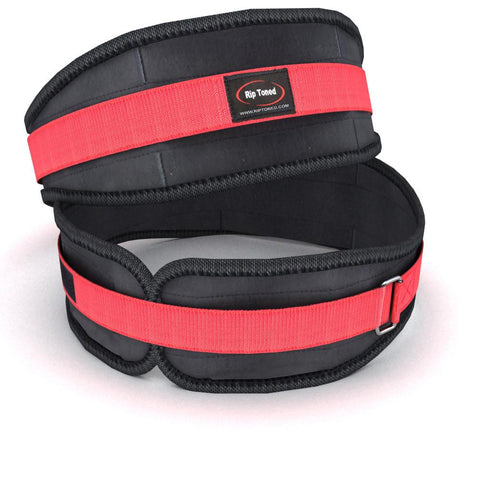
Related Posts
-
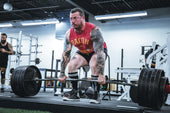
POWERLIFTING THE RIGHT WAY
-
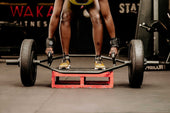
Unlock Your Strength Potential: Conquer Weak Grip Strength Now
-
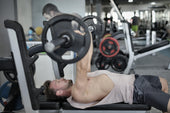
Bench Press to Success - Mastering your form
-

5 Tips for Women to Build Lean Muscle Tone in 2024
-
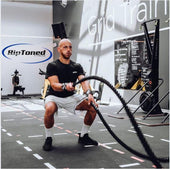
How to Get the Most Out of a Lifting Session
-

Working Out Under the Weather
-

The Lesser-known Benefits of Weightlifting
-

How Weight Training Supports Immune Health
-

The History of Weightlifting
-

Rest up to build up
-
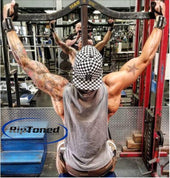
4 Tips to Improve Lifting Gains The Right Way
-

4 Tips to Prevent Training Injuries
-

Top 3 Work Out Myths EXPOSED!!
-

Common Lifting Injuries (And How to Avoid Them)
-
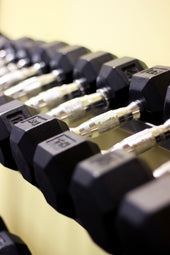
Hit the Gym or Stay at Home?
-

Weightlifting Benefits – Many Health Benefits for Men and Women
-

Why Does Whey Protein Make Me Sick
-

Can Protein Powder Upset Your Stomach
-

What To Mix Unflavored Protein Powder With
-

Crush Your PRs: The Gradual Strength Increase Guide for CrossFitters
-

Whey vs Collagen Protein: Which Is Best for You?
-

Can I Take Whey Protein Without Working Out? What You Need to Know
-

Why Does Whey Protein Hurt My Stomach: Causes and Solutions
-

Boost Your Run: Should You Take Pre-Workout Before Running?
-

Top Pre-Workout Benefits: Boost Energy and Enhance Performance
-
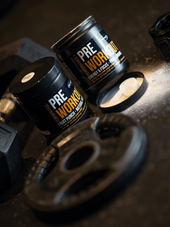
How Long Does Pre-Workout Take to Kick In? Find Out Here!
-

How Long Does Pre-Workout Last? Your Essential Guide
-

Does Pre-Workout Give You Pimples
-

How Long Does Pre-Workout Stay in Your System
-

When Should I Take Pre-Workout
-

Can I Mix Creatine With Pre-Workout
-

Long Term Side Effects of Pre-Workout Supplements
-

How Much Caffeine in Pre-Workout
-

Pre-Workout Alternatives
-

Does Pre-Workout Break a Fast
-

What to Eat Pre-Workout
-

What is In Pre-Workout
-

Advantages of Pre Workout Supplements
-

How To Get Rid Of Pre Workout Itch
-

How To Make Your Own Pre Workout
-

How Many Scoops Of Pre Workout Should I Take
-

How Bad Are Pre Workouts For You
-

How Long Before A Workout Should I Take Pre-Workout
-

How Much Caffeine Is In Bucked Up Pre Workout
-

How Long Does Pre Workout Increase Blood Pressure
-

What Does Pre Workout Do
-

Can I Use Sprite As Pre Workout
-

Can Supplements Boost Weightlifting Motivation
-

Why Do Weightlifters Wear Belts
-

Does Lifting Weights Cause Varicose Veins? What You Need to Know
-

Does Lifting Weights Affect Uterus Health? What Women Need to Know
-

How Lifting Weights Can Affect Your Sex Drive: Does Lifting Weights Make You Horny?
-

Why Don't I Sweat When I Lift Weights? Understanding the Causes
-

Why Are Physical Fitness Attitudes Important? Insights & Benefits
-

Why is Anytime Fitness So Expensive? Understanding Membership Costs
-

Substitute For Whey Protein Powder In Keto Baking
-

How Many Calories Does 1 Hour of Weightlifting Burn
-

A Guide To Cleaner Protein Supplementation
-

What Causes The Frothiness in Your Fitness Drink
-

How to Take Collagen Safely After a Gastric Bypass: Essential Tips
-

Why Do Protein Shakes Make Me Nauseous? Top Reasons and Solutions
-

Why Does My Stomach Hurt After Protein Shake? Understanding Your Digestive Discomfort
-

Can I Take Collagen After Gastric Bypass
-

Why Does My Protein Shake Foam
-

How Long to See Effects of Collagen
-

Can Diabetics Drink Protein Drinks
-

Best Belt for CrossFit: Complete Guide 2025
-

Rip Toned vs SBD Belts: Which Brand Offers Better Value and Performance?
-

The Complete Guide to Women's Weightlifting Belts
-
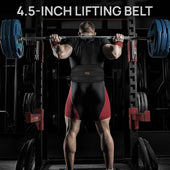
Should Beginners Use a Weightlifting Belt
-
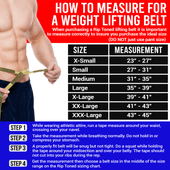
10mm vs 13mm Belt Thickness: The Complete Guide
-

Prong Buckle vs Lever Buckle Belts: The Ultimate Comparison Guide
-

Powerlifting Belts vs Bodybuilding Belts
-

Weightlifting Straps vs. Lifting Hooks: Which is Better?
-

How to Treat Weightlifters Elbow
-

Should You Use Lifting Straps During Bicep Curls for Better Gains?
-

Weightlifting Straps vs. Bare Hands
-

Benefits of Using Weightlifting Straps in Training
-

Mistakes to Avoid When Using Weightlifting Straps
-

Wrist Wraps While Doing Curls
-

Should I Use Wrist Wraps for Bench Press
-

How to Clean Wrist Wraps
-

Are Wrist Wraps Necessary
-

The Ultimate Deadlift Guide: From Form to Performance
-

What Exercises to Use Wrist Wraps For?
-

Are Wrist Wraps Cheating on Bench?
-

Do Wrist Wraps Make You Stronger?
-

Do Wrist Wraps Help With Grip Strength
-

When to Start Using Wrist Wraps
-
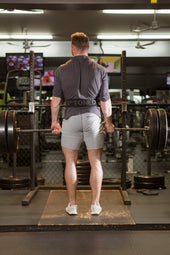
Best Weightlifting Belts 2025: Ultimate Buyer's Guide
-

How to Measure for a Weightlifting Belt
-

Can Wrist Wraps Boost Your Grip Strength in Weightlifting?
-

Should You Use Wrist Wraps for Bench Press and Overhead Press?
-

Do Wrist Wraps Help with Wrist Pain During Strength Training? Find Out Here
-

How Can Wrist Wraps Prevent Injury During Heavy Lifting?
-
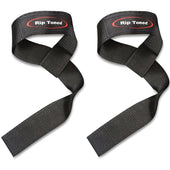
How Do You Use Weightlifting Straps: A Simple Guide for Better Lifts
-

How to Pick a Lifting Belt: A Practical Guide for Every Lifter
-

How to Measure for Lifting Belt
-

Do Weight Lifting Belts Help Lower Back Pain
-

Do I Need a Lifting Belt
-

Purpose of Weight Lifting Belt
-

When to Use a Lifting Belt
-

What Does A Lifting Belt Do
-

What Do Wrist Wraps Do For Lifting
-

How To Wrap A Wrist For Carpal Tunnel
-

How To Wrap Wrist For Pain
-

What Are Wrist Wraps For
-

How Do You Use Weightlifting Straps
-

Why Is Mental Focus Important in Powerlifting? The Key to Peak Performance
-

Can Bodybuilding Help with Fat Loss? Discover Proven Benefits
-

Mastering the Basics: How to Improve Your Powerlifting Technique
-

Why Is Proper Form Crucial in Powerlifting? Tips for Safe and Effective Lifting
-

Can Powerlifting Increase Athletic Performance? Exploring Strength Gains and Sport Benefits
-

Top Tips on How to Avoid Common Injuries in Bodybuilding
-

Why Is Recovery Essential in Bodybuilding: Key Strategies and Benefits
-

Can Powerlifting Improve Overall Fitness? Explained
-

How Much Can a 17 Year Old Deadlift? Average Weights and Tips
-

Why Aren’t My Arms Growing as Fast as My Chest? Top Reasons Explained
-

How to Do Back Compression Deadlift: Best Tips for Pain-Free Lifting
-

Why Is My Bench Press Not Increasing
-
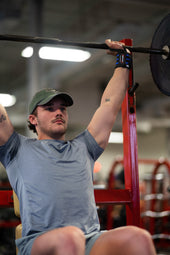
Unlock Your Potential: How to Get Stronger Gradually
-

Unlock Muscle Growth: Understanding What Is the 6-12-25 Rule
-

5 Lbs of Muscle in a Month? Let's Get Real
-

Get that celebrity booty in 10 easy to do work out routines
-

A.M. vs P.M. Workouts
-

Fasting Do’s and Dont's
-

5 Surprising Sources of Protein
-
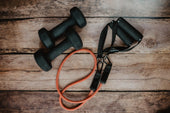
Home Workout Upgrade Must-haves
-
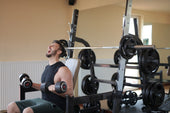
Top 5 Reasons You Aren’t Reaching Your Weightlifting Goals
-
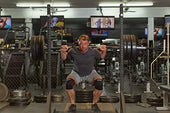
Squats: A Must in Weightlifting and for Strength Training
-

Weightlifting Routines for Men, Women and Beginners








































































































































